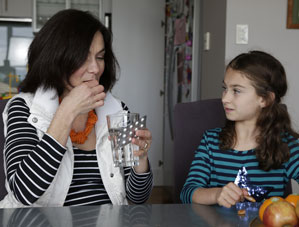People do get better from mental illness – but getting ‘better’ can look different for everyone
Some people are unwell for a period of time and then get better, and their mental health problem never returns. Other people have problems for a long time, but there are periods in between when they are OK. Some people always experience symptoms of being unwell, but they can learn to live with their problems and still have very happy and fulfilling lives.
View a short video about ‘getting better’ from mental illness.
Some things that can help people to get better include:
- Talking to other people who have lived through mental illness.
- Having good relationships with family and friends.
- Learning about how to have hope and staying positive about the future.1
- Having meaning and purpose in life and feeling valued in the world.1
- Feeling empowered to make decisions and choices about your life, and being responsible for those choices.1
- Talking in a group with other people who have similar issues – so that they can encourage and support each other.
- Getting the right support and treatment. For example, seeing a doctor, speaking to a mental health worker at a health centre or taking medicine (medication).
- Spending some time in hospital, when needed.
How mental health workers can help
- Mental health teams, doctors, nurses, counsellors, day programs, support workers and groups can all help people with mental illness to get better.
- All of these services will do an ‘assessment’ to work out what treatments might be best for your parent, and then work with your parent to figure out what will help them the best.
- Remember that not every service will work for every person and sometimes it can take a while to find what works best.
About medication
- Medicine (or medication) is one of the treatments that professionals can use to help your parent when they’re unwell.
- Medication for mental illness usually works on chemicals in the brain. Often this means taking a tablet, or sometimes a few tablets, at the same time every day for quite a long period of time.
- Sometimes it can take a while before you start to see the medication helping your parent.
- Most medications do have side effects (like dizziness, nausea, exhaustion, sleep problems or putting on weight).
When your parent goes to hospital
- If your parent is unwell, they might need to go into hospital for a while.
- Hospital is a time for people to focus on themselves to get better and there are professionals there to help.
- Some people want to go to hospital to get better. But sometimes people can’t see that they need help and are taken to hospital when they don’t want to go.

- Sometimes you might not get told what’s going on when your parent goes to hospital. This is usually because people don’t want to worry you. But it’s ok to find out what’s going on and to ask questions.
- The time people spend in hospital varies depending on the person – from just a few days to much longer.
- A team of professionals will work with your parent to figure out what will help them get better.
- This may include medication, talking therapy, learning new coping strategies and other activities.
Can I visit my parent?
- Some young people like to visit their parents in hospital and some don’t – it is up to you and your family to decide what is best for you.
- If you don’t go and visit your parent, you may like to ask about other ways you can stay in touch. This might be on the phone, text messages or writing them a letter.


